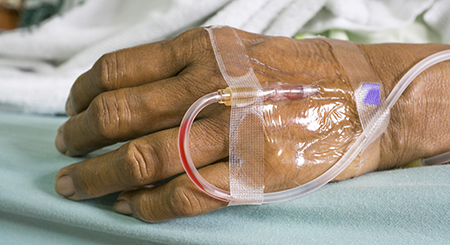Steven, an LPN, works on an acute medical unit caring for Mr. Janson who is recovering from pneumonia. Mr. Janson’s saline lock is due to be changed.

What's next?
Steven knows that initiating or discontinuing a peripheral IV is within LPN Scope of Practice. Steven has successfully completed additional education and has the competence to perform this skill by using a short peripheral device. He follows his organization's/employer's policy when performing this activity.
What's next?
Which BCCNM limits and conditions apply?
LPNs start IVs:
- After successfully completing additional education
- Using a short peripheral device
Relevant Resources